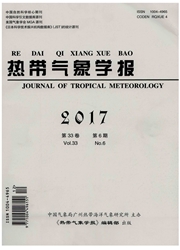

 中文摘要:
中文摘要:
因果关系在许多科学领域中是一个重要课题。在气候变化研究中,一个关键的问题是天气和极端事件的变化是否或在何种程度上可以归因于全球变暖的人为因素。归因分析主要依赖于气候模型,但其在描述非线性系统中存在一定的局限性。本文应用长期观测数据并使用统计方法来探讨此问题。更具体地,本文应用格兰杰因果关系检验方法分析全球二氧化碳浓度与城市化效应对香港气温演变的影响。基于香港1886年至2012年的温度数据,我们发现其夏季平均、最高和最低气温以及酷热天气、热夜日数皆增加趋势。同时可以发现日温度的统计分布变化。格兰杰因果关系分析的结果表明,全球二氧化碳浓度的变化和城市化效应皆对香港气温的演变有所贡献,对于不同的时间滞后性这种效应同样存在。通过与非城市地区的比较,我们发现城市化效应对于夏季气温的升高大概贡献40%。根据初步的结果,文本所引入的方法可以作为一种新的角度来评估局部地区温度升高的原因。分析方法可以扩展至研究其他温室气体对极端天气事件的影响,以及气候变化和社会影响之间的联系。
 英文摘要:
英文摘要:
Causality is an important question across many scientific fields. In climate change research, a crucial issue is whether and to what extent the change of weather and extreme events can be attributed to anthropogenic warming. Attribution analysis is predominantly using climate models, which have inherent limitations in describing the non-linear systems. We investigate this problem using an ahernative approach on long-term observational data. More specifically, we examine the cause effect of global CO2 concentration and urbanization effect on Hong Kong temperature evolution using Granger causality test. Based on temperature data for Hong Kong from 1886 to 2012, we first illustrate the increasing trend of summer mean, maximum and minimum temperatures and the change in the number of very hot days and hot nights. A distributional change of daily temperatures can also be detected. The results of the Granger causality analysis suggest that both the global CO2 concentration and an urbanization effect are driving the evolution of Hong Kong's temperature, and the effect holds with different time lags. By comparing with a non-urban site, we find that the urbanization effect is likely to contribute about 40% of the summer temperature increase. The preliminary results indicate that the approach can offer a useful alternative way to assess the cause of local temperature rises. Our analysis could be expanded to investigate on the causal effect of other greenhouse gases on extreme weather events, as well as the link between climate change and societal impacts.
 同期刊论文项目
同期刊论文项目
 同项目期刊论文
同项目期刊论文
 Organosulfates in Humic-like Substance Fraction Isolated from Aerosols at Seven Locations in East As
Organosulfates in Humic-like Substance Fraction Isolated from Aerosols at Seven Locations in East As Development and uncertainty analysis of a high-resolution NH3 emissions inventory and its implicatio
Development and uncertainty analysis of a high-resolution NH3 emissions inventory and its implicatio Analysis of Spatial and Temporal Variability of PM10 Concentrations Using MODIS Aerosol Optical Thic
Analysis of Spatial and Temporal Variability of PM10 Concentrations Using MODIS Aerosol Optical Thic Determination of Elemental and Organic Carbon in PM2.5 in the Pearl River Delta Region: Inter-Instru
Determination of Elemental and Organic Carbon in PM2.5 in the Pearl River Delta Region: Inter-Instru Relative contributions of secondary organic aerosol formation from toluene, xylenes, isoprene, and m
Relative contributions of secondary organic aerosol formation from toluene, xylenes, isoprene, and m A study of control policy in the Pearl River Delta region by using the particulate matter source app
A study of control policy in the Pearl River Delta region by using the particulate matter source app Emission trends and source characteristics of SO2, NOx, PM10 and VOCs in the Pearl River Delta regio
Emission trends and source characteristics of SO2, NOx, PM10 and VOCs in the Pearl River Delta regio Volatile organic compounds in the Pearl River Delta: Identification of source regions and recommenda
Volatile organic compounds in the Pearl River Delta: Identification of source regions and recommenda Ozone source apportionment (OSAT) to differentiate local regional and super-regional source contribu
Ozone source apportionment (OSAT) to differentiate local regional and super-regional source contribu 期刊信息
期刊信息
